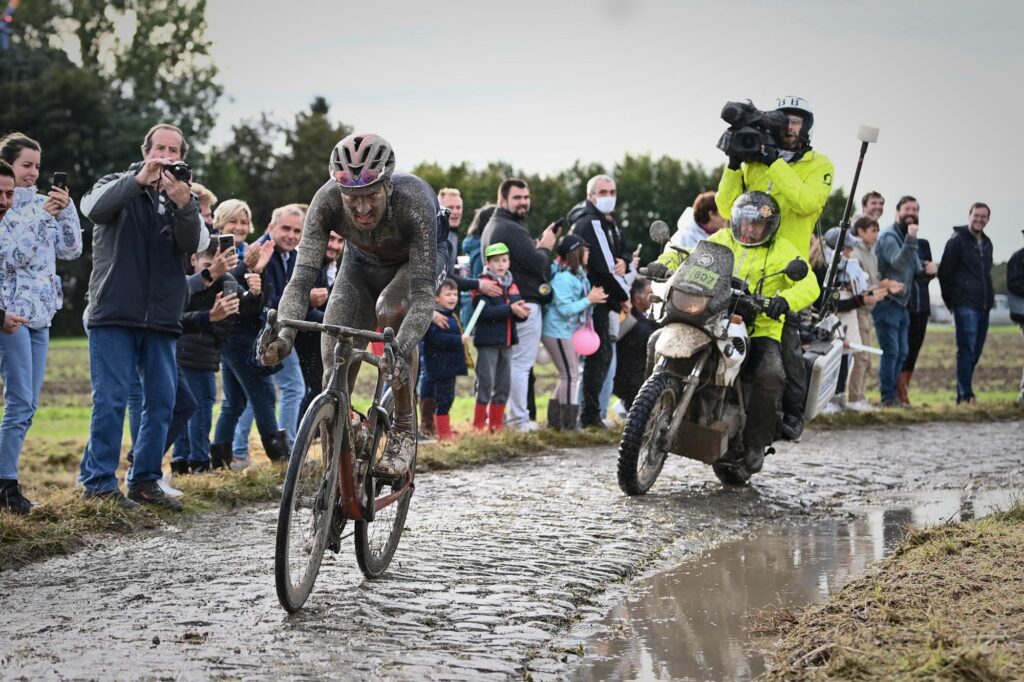Words by Peter Cossins | Photo by SWpix.com
So there we have it, the first edition of the Paris-Roubaix weekend. Two unforgettable races in what were at times apocalyptic conditions, races where every single rider who took to the start-line will certainly have a jaw-dropping story to tell, each of those contests chock-full with incident to debate, performances that should be lauded, and, above all, of reminders of what sets bike racing apart as a spectator sport.
It did seem, though, that as Sunday morning dawned, the second half of the weekend might be a fiasco rather than a triumph. Images began to circulate on social media of the hellish conditions on almost every one of Roubaix’s cobbled sector.
They were best summed up by a gent stripped down to his underpants swimming front crawl in a huge puddle on the fearsome section of pavé at Mons-en-Pévèle. It seemed that the prayers of so many fans for a wet Roubaix had been answered all at once, perhaps even to the point where a cancellation or at least a diversion around some of the cobbled sectors seemed possible. Indeed, the organisers of the junior edition of Roubaix, which isn’t run by ASO, opted to do precisely that by removing the Mons-en-Pévèle lido section of the route from their event that took place first thing on Sunday morning.
ASO head of cycling Christian Prudhomme quickly squashed any suggestions that there might be any changes to the elite course. As the riders gathered in the gloomy grandness of Compiègne, Prudhomme told the media: ‘It’s Roubaix’s difficulty that makes it legendary. If a rider doesn’t want to start, he doesn’t have to.’
‘It’s Roubaix’s difficulty that makes it legendary. If a rider doesn’t want to start, he doesn’t have to.’
Christian Prudhomme
When the race got under way, it seemed a good part of the peloton wanted to adopt Lizzie Deignan’s strategy from the day before – attack early and, as a consequence, arrive first at the cobbles and be able to pick the best line through them. At that point, the rain was still teeming down, turning every road junction and roundabout into a skidpan that demanded careful navigation.
When, after 100 kilometres of racing, the lead group reached the first section of cobbles at Troisvilles, my heart went into my mouth. Racing on them was almost a lottery, the central spine of the road often the only part of it standing proud of the lake-like puddles. There were crashes aplenty, and punctures and other mechanical issues were so frequent that it was nearly impossible to keep up with which riders were in which group, a task made even more complicated by the grime that quickly accumulated on their faces and chests, concealing all means of identification. From the front, the race became two-tone and could have been from almost any era. Only from above was it possible to pick out the distinctive colours of trade teams jerseys and jackets, and establish who was where.
Two moments summed up the race’s descent into something approaching chaos: 2017 Roubaix winner Greg Van Avermaet looking into the lens of the TV camera on the motorbike alongside him and shaking his head with evident disgust; and Christophe Laporte bending his right leg backwards to use his shoe as a brake on his rear wheel as his discs had, it appeared, jammed up with dirt.
However, just when it looked like the course might become unrideable, the weather gods intervened once again by turning off the taps as the riders neared the most testing sections of cobbles. A combination of a strong wind and the convoy of vehicles and motorbikes ahead of the race helped to disperse much of water from the pavé. Vitally, it meant that a contest that would had been a matter of survival became a full-blooded race.

There were still spills, but the riders that were able to cope the best with the conditions started to emerge. Initially, Ineos Grenadier Gianni Moscon (pictured above) looked set to emulate Lizzie Deignan with a long-range solo win that undoubtedly wouldn’t have been welcomed with the same universal delight as the British woman’s success – the Italian’s big talent has been overshadowed by his ability to generate controversy, including his racist abuse of Frenchman Kévin Reza, his disqualification from the 2018 Tour after punching another French rider, Elie Gesbert, and his disqualification from Kuurne-Brussels-Kuurne last year for throwing a bike at Belgian Jens Debusschere.
However, bad luck – or was it karma? – fatally undermined Moscon’s hopes. It arrived first in the form of a rear wheel puncture. After swapping to his spare bike, the Italian suddenly looked uneasy on the cobbles and went down in almost exactly the same place on the Cysoing section where Deignan had managed to hold her snaking bike upright the day before. The chasing trio of Mathieu van der Poel, Sonny Colbrelli and Florian Vermeersch didn’t quite reach Moscon straight away, but soon reeled him in and left him to his personal battle on the pavé once again, now riding for fourth place rather than first.
The only thing certain about the contest between this trio was that one of them was going to be the first rider to win on their Roubaix debut since a least the 1950s – 1955 victor Jean Forestier, the oldest surviving champion, was believed to be the last debutant to win but revealed in the run-up to the race that he’d abandoned before halfway the previous year. Vermeersch, 22 and best-known hitherto for his bronze medal in the World U23 Time Trial Championship last month, appeared the most unlikely winner among the three leaders, but predicting the verdict of a sprint after 257km of racing is, cycling history has often shown, never easy. In this case, though, Colbrelli fully lived up to his reputation as a sprinter of real quality.
He leapt with surprising agility from his bike, raised it above his head, then roared with a mixture of ecstasy, relief and incomprehension, which was the fitting and wonderfully cathartic reaction to what we’d all seen over the previous six hours. Around him, riders flopped to the ground, some of them disappointed, all of them absolutely exhausted. Prudhomme was right. Roubaix’s difficulty had added to its legend – for the second time in two days. Happily for fans of the cobbles, only 195 remain until the next Hell of the North weekend.






